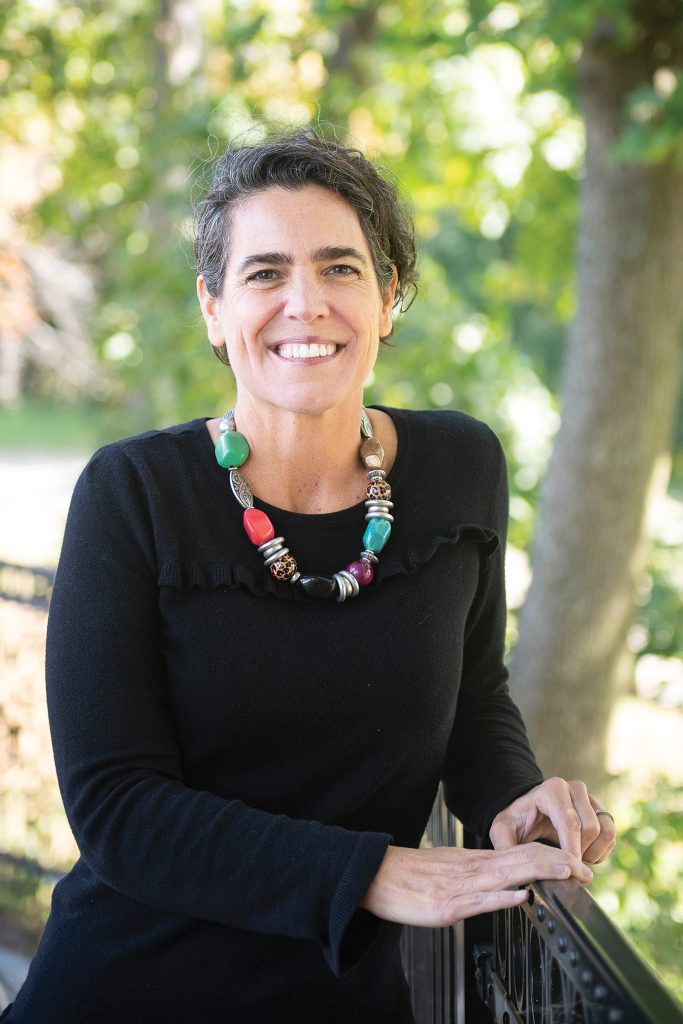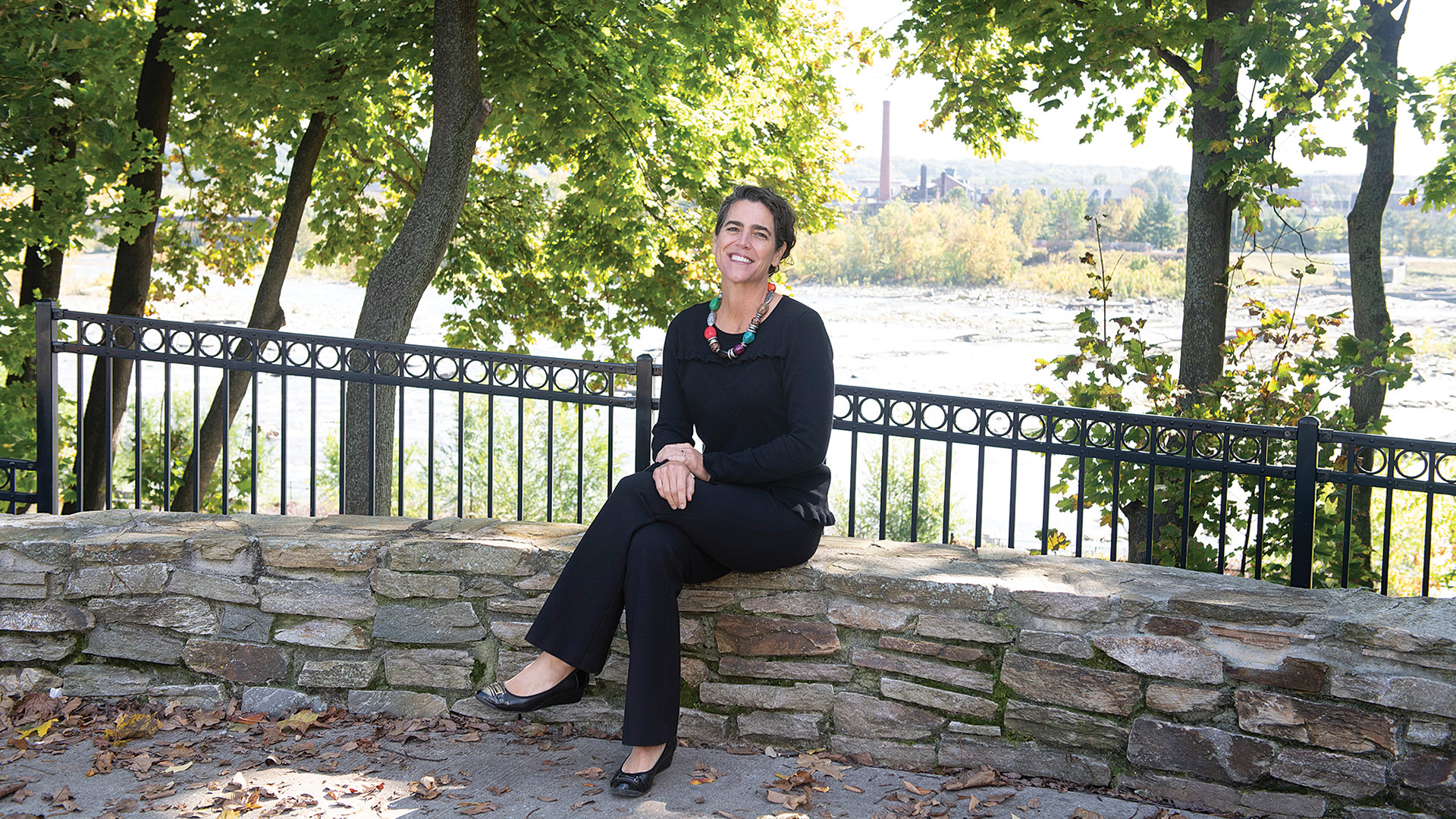Jessica Collins
Executive Director, Public Health Institute of Western Massachusetts
She Builds Coalitions to Tackle the Pressing Issues Facing Our Communities

Jessica Collins majored in history at Wellesley College. Her specific focus, the one she developed her thesis around, was the 1960s, specifically the Kennedy years and the men and women who defined them.
“I always found that time period very inspiring, and I think we’re still leaning from it today — there’s certainly some unfinished business,” she said. “I loved the oratory, the power, and the poetry of so many of the people at that time. I was always touched by it.”
So it probably shouldn’t be surprising that, upon graduating from the elite women’s school, she would heed Kennedy’s mantra of service to country and others and leave for the Pacific Northwest to serve as a Jesuit volunteer care coordinator for people living with HIV and AIDS. Her next stop after that was a two-year stint in West Africa with the Peace Corps — a tour of duty that ended when a coup erupted in Guinea-Bissau.
In both cases, it was public health — and a desire to help populations in need — that prompted which direction she took, both in terms of the compass and her career. And it’s the same today as she serves as executive director of the Public Health Institute of Western Massachusetts (PHIWM), formerly Partners for a Healthier Community.
The population in need is the one living in the 413 and especially Greater Springfield, and Collins and her growing team have responded with initiatives addressing issues ranging from asthma and obesity to food insecurity and oral health.
But they never address issues alone. Instead, it is in partnership with other nonprofits and healthcare providers, which illustrates what has become perhaps Collins’ strongest attribute among many — her ability to forge coalitions that can bring about meaningful change with regard to some of the most pressing, and persistent, public-health issues facing this region.
One of the latest engagements of this nature is called DASHH (Doorway to an Accessible, Safe and Healthy Home), a broad collaborative effort involving the PHIWM, Baystate Health, the Revitalize Community Development Corp., and other players that was recently honored with BusinessWest’s Healthcare Heroes award in the Collaboration in Health/Wellness category.
Through the program, launched in 2015, these organizations not only identify families in need of intervention for environmental health issues and educate them on lifestyle changes, but actually make the needed physical changes to their homes.
This is the kind of collaborative effort that not only brings about positive change within the community, but inspires individuals and groups to think about what else can be done, said Colleen Loveless, herself a Woman of Impact, who nominated Collins for the award this year.
“Jessica has made impactful contributions to the local and statewide community that have had positive ripple effects throughout the nation,” Loveless wrote. “She exemplifies spirit, service, compassion, and empathy for others, and exhibits a high sense of professionalism in everything she does.”
These traits, and especially her ability to listen, learn, and then mobilize forces to combat health and wellness issues and build stronger neighborhoods, have made Collins a true Woman of Impact.
Healthy Attitude
Returning to her time at Wellesley, Collins said that, while history and the Kennedy years were — and still are — a fascination, volunteering, or giving back, was — and still is — a passion.
And it took her first to the Northwest and her work with those living with AIDS.
“It was still tearing communities apart at that time,” she said of the disease. “This was still before they developed the ‘cocktail,’ a blend of medications that really came through in the late ’90s. At that time, people were dying, and it was people across all socio-economic classes; it was a very eye-opening experience.”
So, too, was her time in West Africa and the tiny nation of Guinea-Bissau, where she worked at a health center in a small village of 1,700 people. Working with a midwife and a nurse, she provided lessons in health education. “I obviously learned 100% more than what I taught,” she recalled.

Jessica Collins has devoted her career to public health and addressing some of the larger health problems facing society.
“From both of those experiences, I knew I wanted to be part of something that would allow people to be healthy,” she explained. “It just fit my groove.”
Elaborating, she said she came to understand that she didn’t want to do this work one-on-one, but rather in a community-health setting, and with that goal in mind, she went about earning a master’s degree in food policy and applied nutrition from the Friedman School of Nutrition and Policy at Tufts University.
With that degree, she took a job as project manager of the Institute for Community Health in Cambridge, where she oversaw an overweight-prevention pilot study. Later, she served as project manager for Tufts’ “Shape Up Somerville: East Smart. Play Hard” study that received national recognition for reducing BMIz scores in high-risk third-grade students in Somerville Public Schools.
“ Jessica has made impactful contributions to the local and statewide community that have had positive ripple effects throughout the nation.”
When she relocated with her family to Western Mass., she joined PHIWM as director of Special Initiatives, and in 2015 she became executive director. She described the assignment as one that also fit her groove and gave her an opportunity to be a part of broad efforts that would change lives on many levels.
One of her first initiatives was to work with others to form the Live Well Springfield Coalition, which has been successful in increasing access to healthy eating and physical activity for residents and implementing a number of strategic initiatives, including the Go Fresh Mobile Market.
When asked about PHIWM, its mission, and how the agency carries it out, Collins said that, in essence, it watches, listens, identifies issues to be addressed, builds coalition to address them, creates action plans (with the actions varying from case to case), and, eventually, hands the issue off another group to handle and moves on to the next challenge — or challenges, to be more precise.
“We take on issues where we have heard from the community that there needs to be attention paid to that particular health issue,” she explained. “We look at the health issue both from stories we hear from people in the community as well as hard, quantitative data, and then we build a team.

“We invite people to the table with whatever strengths and value they’re going to add, and we lead the process,” she went on. “Sometimes there’s policy outcomes, sometimes there’s programmatic outcomes, and sometimes … there’s all of it. And we hold it close until there’s another group that’s poised to take it over.”
As an example, she cited the GoFresh Mobile Market, which was recently handed over to Wellspring Cooperative, a Springfield-based nonprofit that boasts Wellspring Harvest, a commercial hydroponic greenhouse in Indian Orchard that brings healthy, locally grown produce to area hospitals, schools, and residents.
“That’s just one example of how we incubate, and it’s another opportunity for another organization to take it on, build their mission out, and bring in new funding for themselves,” she said, adding that this has been the pattern followed with several public-health matters, including oral health, asthma, and transportation for patients who need it to get to appointments.
DASHH is another example, she said, adding that the PHIWM incubated the large and persistent problem of asthma and essentially handed off the healthy-homes initiative to the CDC, which can take action to address the matter on a much higher plane.
“It went from basically health education and showing up with a flyer to Colleen’s agency showing up remediating homes,” Collins said, adding that this work eventually led to a broadening of that specific mission to air quality, climate change, and the creation of a new coalition called Social Justice for Climate Change.
And that’s just one example of how interconnected the problems concerning public health are and how difficult it is to generate meaningful change.
“Public health and community health are never cut and dry — there’s not just one solution that’s going to help people lead balanced lives,” she explained. “It’s far more complicated than that, and that’s why we appreciate that this work takes decades, and we’re here to stay with it and to test different programs. It’s slow going.”
History Lessons
The next challenge for the PHIWM and Collins will be youth mental health, an issue essentially chosen by the city of Springfield even before the pandemic, which has only added more layers to an already complicated problem.
“We’ve been working on it for a year, and we’re in the phase of building our team and identifying strategies that we want to test in order to support families and kids around anxiety, depression, and suicidality,” she said, adding that still another priority for her agency, being addressed in partnership with the state Department of Public Health, is trying to understand how to “build capacity around the conversation of racial equity in this region,” as she put it.
“When you control for lots of different things when you’re doing data analysis around health indicators, it is clear that the color of people’s skin is still a top indicator for health,” she said. “And bringing health indicators to a level playing field will not be done until we can truly address one of the most significant root causes, which is racism in this country — so we’re working with a lot of different people to try to figure it out.”
That last comment effectively sums up what has become Collins’ life work and her significance to this region. Since arriving here, she has worked with countless individuals and groups to ‘figure it out.’
She is an administrator and advocate for those in need, but mostly she is a builder — of powerful collaborations that are changing the landscape when it comes to public health. It’s happening slowly, as she said, but it’s happening.
And that’s what makes her a Woman of Impact.
George O’Brien can be reached at [email protected]





